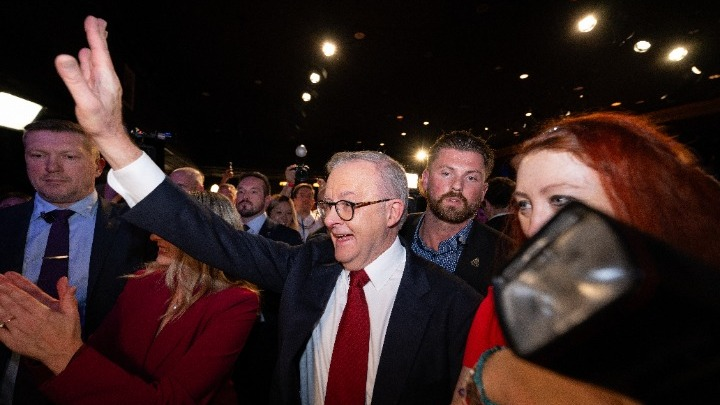IN THE MEDIA
Australia has voted — so what happens now for the Jewish community?
May 9, 2025 | Justin Amler

The Algemeiner – 8 May 2025
On Saturday, May 3rd, Australians cast their votes – and the results speak volumes.
Of the 150 seats in the House of Representatives, Prime Minister Anthony Albanese’s Labor Party secured 90 – a gain of 13 seats. The opposition Liberal/National Coalition suffered a major setback, losing 18 seats and falling to just 40.
While final counts in some seats are still ongoing, the result is clear: Labor has secured a decisive mandate and will govern with a majority, independent of support from minor parties.
For Labor supporters, it was a night of jubilation. While polls suggested a likely win, the scale of their success exceeded expectations, giving them a strong hand for their second term.
For the Coalition and many in the Australian Jewish community, the outcome was deeply disappointing. Over the past 19 months, the Coalition had demonstrated strong moral clarity, particularly in its steadfast support for Israel and the Jewish community, although these issues played no significant role in the election campaign. The defeat was made even more painful by the loss of Coalition leader Peter Dutton’s seat.
Yet, there was a silver lining. The Greens – a party whose members have frequently expressed hostility toward Israel and engaged in rhetoric that many consider antisemitic – suffered heavy losses. While they still hold influence in the Senate, the election results significantly curtailed their potential power. Australians appear to have rejected their more extreme positions, which is a welcome development for the country and especially for the Jewish community.
Still, the road ahead remains uncertain and likely challenging.
There is perhaps some hope that a Labor government, now less reliant on Greens support, may pursue a more centrist and pragmatic approach toward Israel. Yet, their track record over the past term offers serious reasons for concern.
Shortly after taking office, the Albanese government reversed long-standing bipartisan positions on Israel, straining the previously warm and stable relationship between the two countries. In October 2022, they rescinded Australia’s recognition of west Jerusalem as Israel’s capital – a move announced on Simchat Torah, when Jewish organizations were unable to respond promptly due to the holiday.
Then, in August 2023, the government adopted a position of referring to all disputed areas in the West Bank (Judea and Samaria) as “occupied Palestinian territories,” and labeled Jewish communities there as “illegal.” Nevertheless, Foreign Minister Penny Wong still maintained that final borders must be determined through negotiations. Yet, by unilaterally adopting this terminology, Australia appeared to preempt the very negotiations it claimed to support.
After the horrific Hamas attack on October 7, 2023 – in which 1,200 Israelis were murdered and 251 taken hostage – the government’s immediate response called for Israeli restraint, even amid unprecedented brutality. During the ensuing war, the government has been frequently critical of Israel’s military actions, including operations targeting Hamas infrastructure embedded in civilian areas like hospitals – despite clear evidence of Hamas’s use of such sites, in blatant violation of international law.
The government also shifted its voting patterns at the United Nations, increasingly supporting or abstaining on resolutions widely seen as biased against Israel.
It also continues to financially support UNRWA, despite that organization’s direct links to terrorism, where UNRWA employees were found to have participated in the October 7 massacre and their facilities used as part of Hamas’ terror infrastructure.
In November 2024, the government denied a visa to former Israeli minister Ayelet Shaked, citing concerns her presence might “incite discord” or “vilify” Australians. This came despite having granted a visa a year earlier to UN Special Rapporteur Francesca Albanese, who has drawn condemnation for antisemitic statements and comparisons of Israel to Nazi Germany. To the government’s credit, it did deny entry to controversial US commentator Candace Owens for past remarks downplaying the Holocaust.
Domestically, the rise in antisemitism has been alarming. Between October 2023 and October 2024, antisemitic incidents surged by 316% – the worst spike in living memory. Following the Adass Israel Synagogue bombing in December 2024, the government has shown a greater willingness to engage with the Jewish community and confront this growing threat – a positive shift that should be acknowledged, along with the hope of a stronger pushback against antisemitism in all its guises.
But what happens next is uncertain. With Labor re-elected and holding an even stronger position, the question is whether they will return to the bipartisan traditions that underpinned Australia’s foreign policy for decades – or whether they will double down on policies that risk alienating allies and empowering extremists.
As tensions in the Middle East escalate once again, public pressure on the Australian government to adopt harsher stances against Israel may grow. This, historically, has translated into real-world consequences for local Jewish communities, who often bear the brunt of anti-Israel sentiment.
We don’t yet know what lies ahead. But we can be certain of one thing: the road forward will be anything but smooth.
Justin Amler is a policy analyst at the Australia/Israel & Jewish Affairs Council (AIJAC).
Tags: Antisemitism, Australia, Australian politics, Elections, Israel





